Part 124: Supplementary Lesson #9: Compare/Contrast Female Dating Games and Male Dating Games

By popular vote, I am here to discuss some of the similarities and differences that I have found between boy dating games and girl dating games. Specifically, I’ll be going over all of the archetypes that we’ve discussed over the course of this Let’s Play and how the context of the characters changes how they are portrayed. I did a bit of this discussion within the Let’s Play itself, but this will be a deeper look into these genres side-by-side, as well as some representative characters to see how they differ in actual implementation.
One particular thing that I noticed while working on this update is that otome games put a lot less focus on sexual content. There definitely aren’t as many otome games with sexual content as there are with male dating games, and those that do are usually Rejet. I mean, there are a number of other companies who produce those sorts of otome games, but male dating games definitely have a larger focus on adding sexual scenes in order to bring in more sales, even those that are heavily focused on a narrative, such as Fate/Stay Night. Different audiences and all that, I suppose, but I would like for you to keep in mind that many of the games I will talk about in this upcoming writeup will involve sexual situations in one way or another, and I may make reference to it. It’s almost unavoidable in this sort of discussion, though I will do my best to avoid talking about particularly egregious games. Because of this, some of my generalizations may not fit 100% with the characters I describe, since most of the traits I discuss come from a broader point of view of these archetypes.
Another thing I noticed was that for the most part, otome games put a larger focus on character development, while male dating games focus more on the development of the relationship. Even in the simplest otome games, the dateable characters go through a definable character arc from flawed character with issues to flawed character with resolved issues. Male dating games see much less change on this sort of spectrum, with many games focusing on how the relationship develops and grows without having the characters change at all. This tends to make for shallower characters, but again this can be chalked up to different audiences for the most part.
On the other hand, you tend to find the same relationship dynamics in both types of games. No matter how boring a male player character is, he will find a way to make every girl swoon over him. A female player character is always looking for a doting boy to take care of her and protect her, and no matter how boring she is, every boy will want to protect her and shower her with love. There are occasional subversions to this, as it has become more common to include stronger female characters in both genres, but for the most part traditional gender roles still play a large part in dating games.
But enough with sweeping generalizations, let’s get this comparison party started!
Teachers
As we saw in the original writeup, otome games don’t tend to make a particularly serious distinction between teachers and any other character, but often play up the “forbidden love” aspect of the relationship, both in terms of age and status.
Male dating games, on the other hand, put some very clear archetypes onto their teacher characters. The teacher might be a very strict, independent woman who keeps all of the students at a distance in order to complement her position and authority. However, she has a soft side that she keeps hidden away, wishing to be loved but scared of the prospect. The teacher might also be a very kind and friendly woman who tries to make personal connections with all of her students. She’s often ditzy and considered immature, which causes some teasing on the part of her students, but everyone seems to like her for her happy attitude. Both of these archetypes give off a “mature” vibe, either as an independent working woman or as a motherly figure, and their character designs often play up a “mature” look for the characters. It plays into a particular fetish that is not often represented in dating games, and because of this, the teacher archetype tends to only appear in less-reputable visual novels.
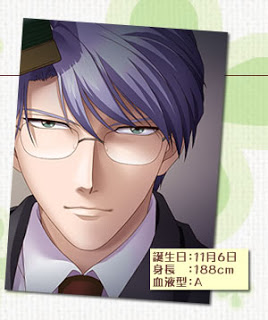
Reiichi Himuro is a character from Tokimeki Memorial Girl’s Side. He is the homeroom teacher and math teacher for the main character. He also runs the band at school. He is 27 at the start of the game, making him 12 years older than the main character. He is very stern and serious, always trying to look as professional as possible. Most of the MC’s interactions with him early on are supplementary lessons, though eventually he will also offer to drive you home (in his cool Maserati [the game plays up that Reiichi has a cool Maserati]). On his birthday you can give him presents, but he doesn’t like frivolities so you’re supposed to just turn in your homework with a nice “Happy birthday”, because he is a very serious person y’know. As he starts to open up to you more (and learns how to relax), he will call and offer to take you out on dates, but he says that it’s a “social study” and not a date, because he likes to at least keep up the air of being professional, despite the fact that he’s dating a student.
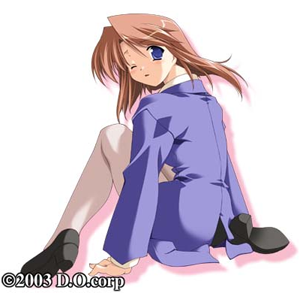
Misato Souya is a character from the visual novel Snow Sakura, which is a run-of-the-mill high school romance simulator set during the winter, starring a boring eye-less student named Yuuji Tachibana.
Misato is the history teacher, the older sister of one of Yuuji’s classmates, and is (presumably) in her mid-20’s. Despite her position, she wants to interact with her students on a more personal level, and so she joins them for various activities outside of class in order to be part of the circle of friends that Yuuji makes. However, she’s a very airheaded woman, prone to accidents and considered useless outside of her academic field. She stumbles over perfectly even ground and falls asleep during her own lectures. She’s also known for drinking way too much when out in public. Still, she’s dedicated to her work and aspires to be an inspirational teacher. She feels like she’s becoming too old to be loved, and so when Yuuji confronts her about his feelings, she latches on to him. However, things start to get difficult after Misato gets caught smooching Yuuji on school grounds, breaking the teacher-student relationship code. Trying to keep any sense of professionalism, she takes responsibility and leaves the school, moving many miles away to teach at another school. After Yuuji is done feeling like a sad sack, he decides that love should not be kept down by any sort of boundaries, so he transfers to Misato’s new school and joins her class, where he proceeds to kiss her in front of the entire class, who break out into cheers because apparently this is suddenly okay.
Female teachers are definitely more sexualized than their male counterparts, and in fact I cannot think of a single game outside of the Tokimeki Memorial series that treats dateable teachers as anything other than an object of fetishization. I think this comes from the fact that these relationships are often considered taboo and creepy due to the age and status difference, so the only games willing to take on the subject matter are the ones that aren’t considered with any sort of dignity.
Childhood Friends
In the original childhood friends writeup, I outlined three general types that you’re sure to find in this huge, expansive category. There’s the brotherly character, the flirty and defensive character, and the quiet and brash character.
These three categories work equally well to describe most of the childhood friends in male dating sims, and really this is probably the most equal archetype in terms of representation. Both genres have these friends who have had crushes on the main character since they met however long ago, but find it difficult to show their feelings due to the fear of being rejected. They’re always really close to the MC in whatever they do, and are usually the easiest characters to connect with and date. These characters also tend to have more intimate scenes, as the characters are already comfortable with each other and interact with each other more than other characters.
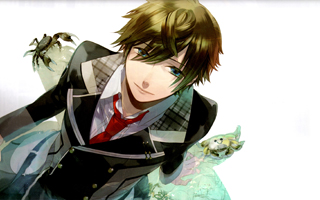
Suzuya Tohzuki is a character from Starry Sky~In Spring. He is a Cancer, and has been best friends with Tsukiko and Kanata since childhood. He is the “older brother” of the group, since he tends to be the mediator between Kanata and Yoh when they start to fight, and he often makes lunches for his small group of friends. He is often referred to as “mom” by Tsukiko and Kanata. He tends to be soft-spoken and gentle. When he gets angry, he is known for being very frightening, but he keeps most of his negative traits hidden under his paternal instincts.
Suzuya has had a crush on Tsukiko since childhood, but has kept quiet about it since he knows Kanata also has a crush on her. Tsukiko eventually gets him to confess his feelings, and after they start going out, Suzuya becomes a very jealous lover and very protective of Tsukiko. He freaks out if she talks to another boy, or if either of her other childhood friends makes physical contact with her. He ends up being even more possessive of her than Yoh, to the point of monopolizing her. But his devotion to Tsukiko is an endearing trait, and so they fall in love and everyone is happy.
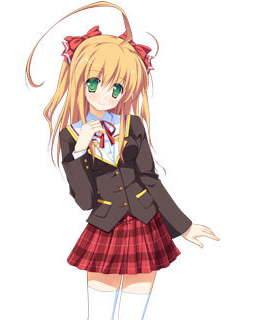
Yukino Ohama is a character from the visual novel My Girlfriend is the President, which is about aliens crash-landing in Japan and covering it up by brainwashing the masses into believing that Yukino is the president of Japan and giving her the ability to also brainwash others in order to make all of her decrees true. She is a parody of Barack Obama, and is the childhood friend of the faceless main character and vice-president Junichiro Hondo.
Yukino’s very kind and patient, though she has difficulty being in the spotlight all the time. She is a very strong student – the top of her class – and takes part in multiple clubs. Yukino is very clumsy in her private life, but always tries her best when it comes to Junichiro; she goes over to his house every morning to wake him up and make him breakfast (poorly). She gets jealous if other girls try to put the moves on him, but otherwise is perfectly fine to share his attention with others. She also has a strong appreciation for anime and manga, which tends to come out in her speeches. Much of Yukino’s route is based around secret rendezvous between her and Junichiro, with him acting as a Secret Service bodyguard to protect her from the rabid fan club of jealous men that her brainwashing powers have created. At the end of the game, as the aliens leave, the couple is told that the next time they kiss, everything will be reset in the world. Junichiro and Yukino wonder if they’ll still love each other after their memories are wiped, but then they mess up the kiss and everything is the same as before… except that everyone suddenly knows about the aliens and all the people who died in the alien crash are alive again. But hey, your girlfriend is still the president!
Childhood friends are a staple of both genres and probably the most similar archetype between male and female dating games. They’re not particularly sexualized in male dating games, either. Whether that’s due to competent writing that actually portrays the awkward development from friendship to romantic relationship or not is up in the air. It could also be that these are supposed to be more plain characters in a cast of wacky archetypes.
Doctors
In a similar fashion to the doctor archetype in female dating games, this is an unexplored genre for male dating games.
However, there are a number of games that include nurses, and even games centered around nurses, but none of them are interesting and are really only there to serve a particular fetish, so overall it’s not worth discussing.
Chuunibyou
While I was looking around for examples, I was shocked to find out that there were any dating games that had chuunibyou characters. However, it turns out that almost all of them are based around the anime series Chuunibyou Demo Koi ga Shitai!, which is pretty disappointing and not worth looking into, since it’s all adaptation rather than building new characters around an archetype.
Playboys
During the initial playboy writeup, I discussed how narcissism and natural flirtatious charm cause these characters to take a holier-than-thou position, creating a generally unlikeable character archetype.
As a number of people in the thread have postulated, there isn’t a direct parallel to this sort of character in male dating games. The closest equivalent in the case of status is the “popular girl” archetype, which generally does not carry the same connotations as the “playboy” does. In general, those girls that are popular are usually beautiful and radiate a positive atmosphere, which helps them make friends with other girls and grants them a fan club of boys who all want the chance to love her. These girls tend to either be aloof and unaware of the attention they draw from men, or aware of their fan club and clever enough to keep them all at arm’s length while still acknowledging their “love”. Either way, it makes it difficult for the main character to make any sort of romantic advances towards her, but the idea of being in a relationship with the popular girl (which by proxy makes him popular) is a strong enough desire to help him persevere.
Ikki is a character from Amnesia. In his first appearance, there is a group of women literally following him and clinging to him, and he smooth talks all of them. He’s incredibly flirty and affectionate, especially physically. He is polite and attentive to all of his fangirls and Heroine, and makes sure to treat them all with kindness. He is said to be skilled at any activity that involves his hands.
When he was a child, he was very lonely and wanted to fall in love, but no one paid attention to him. And so, after seeing a shooting star, he wished that he was popular with girls. His wish was fulfilled, and he was granted a special gaze that would make any woman fall for him. While he got what he wished for, any woman who caught his gaze would immediately fall in love with him, causing his group of fangirls to increase. He eventually lost the ability to connect emotionally or grow close to anyone, since all of his fangirls became hopelessly devoted to him, with little personality otherwise. However, Heroine was different, and was the only girl not to fall for his gaze. Because of this, Ikki became interested in her, and they eventually started dating, much to the dismay of his fangirls. They decide to try and break Ikki and Heroine up, so that there will be nothing between them and their ~true love~. They plan to attack Heroine and spread nasty rumors about Ikki’s romantic attitude in order to dissuade Heroine from continuing the relationship. Ikki, becoming aware of the plan, decides to confront his fangirls about his feelings for Heroine. He says that should any harm come to Heroine, he would never forgive them. He finishes by punching a hole in a nearby wall, scaring all of his fangirls away. Then Ikki and Heroine live happily ever after.
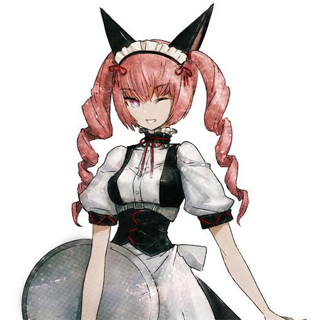
Faris NyanNyan, real name Akiha Rumiho is a character from the visual novel Steins;Gate, which is about a man named Rintarou Okabe who must partake in some serious time manipulation in order to avoid World War III.
Faris is the owner of a maid café called May Queen Nyan-Nyan, where she also works and is the most popular waitress. Working in the heart of Akihabara (aka Japan anime nerd central), she does a lot to play up her cuteness, like ending many of her sentences with “Nya”. She has the ability to read people’s hearts by looking into their eyes, and is more than happy to play along with Rintarou’s chuunibyou delusions. Her playful attitude and pandering to anime cuteness stereotypes has earned her many diehard fans both in and out of work, and she’s held up as an important figure in Akihabara. During one of the timeline divergences, it is discovered that Faris is actually the heir to a large computer company, and after her father’s death, she used the money to make Akihabara the anime haven that it is today. While she puts on an air of disconnectedness and perpetual happiness, she’s depressed about the death of her father. Although she’s surrounded by fans, she finds herself unable to connect to others, fearing they’ll all disappear from her life like her father did, so she’s very lonely. However, Rintarou, being the aloof and equally unconnected dork he is, is able to show Faris that the people who surround her care about her and that she shouldn’t have to be so afraid or alone.
While there’s no direct parallel to playboys in male dating games, there are still characters that garner fan clubs for their looks and personality, so I feel like this is the closest equivalent. Even flirty characters are uncommon in male dating games, though those who do exist tend to also be highly charged and sexually experienced.
Athletes
I said in the original writeup that athletes were a niche in otome games, as they are often written to be solely defined by the sport they play and their devotion to it. The other alternative is to make their sport a very minor part of their character, but this often makes it difficult to classify these characters as athletes in the first place.
Male dating games still treat athletes as a niche. Outside of the Tokimeki Memorial games, I’ve had some serious difficulty finding examples of athletes in male dating games. Or at least not from games where the only reason there’s an athletic character is in order to fetishize Japanese gym uniforms. The characters that I did find, however, are incredibly passionate about their sport of choice, and are generally very active and energetic, always looking forward to a new day of practice. While they are dedicated to their sport, they also take time off the field to make friends and interact with other characters in a meaningful way, so they fall less into the trap of one-note characters. Their physical activity usually means that they’re more flexible when it comes to sex, and their energy means that they have longer scenes because of their ~incredible stamina~.
However, with the development of things like “Moevation: Burn Your Fat With Me”, perhaps there’s a chance that this archetype will see an increase in popularity as app developers try to convince otakus to exercise.
Ryunosuke Miyaji is a character from Starry Sky~In Summer. He is a Scorpio, and is vice-captain of the archery club. He acts very serious and is often calm, though he is prone to argument. He’s hardworking and abrasive, but hides a shy and easily embarrassed side and a penchant for sweets. He regards Tsukiko as a rival and is constantly keeping an eye on her and her progress in the club. He often bickers with Azusa, who he sees as worthless since he relies solely on skill rather than practice and hard work. In his route, Ryunosuke tries really hard not to show his true feelings to Tsukiko, but hints at it when he rejects a love letter because it’s not from Tsukiko. I say “hint” instead of “make it glaringly obvious” because Tsukiko doesn’t pick up on it. Eventually he has to admit his feelings for her when he decides to kiss her while she’s trying to help pin his hair back. It turns out that he was worried that Tsukiko was dating Azusa, and so when it turns out that she’s single, he’s excited and they start dating. At the end of the game they decide to get married once they both graduate college, and everyone lives happily ever after.
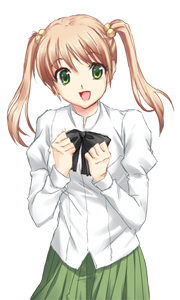
Emi Ibarazaki is a character from the visual novel Katawa Shoujo, which is about a boy by the name of Hisao Nakai, who is transferred to a school for disabled people after an arrhythmia attack almost kills him.
At eleven years old, Emi lost her legs in a car accident that also ended up killing her father. Her father was a runner, and in honor of his memory, she decided to take up running after her rehabilitation with her prosthetic legs. Now in high school, Emi is the star of the track team and is known for her energetic happy-go-lucky attitude. However, this also gets her into trouble more often than not, as she tends to overexert herself to the point of injury and run through the school hallways, bumping into students willy-nilly (and at one point setting off Hisao’s arrhythmia). Her relationship to Hisao is dependent on him joining the track team, at which point she becomes his personal trainer, helping him to get in shape while also trying to avoid making his heart condition worse. As they grow closer, Emi shows how stubborn she can be, refusing to take help from anyone, trying to act strong and independent in order to hide her fears about losing those close to her. But Hisao’s insistence on helping her and trying to be there for her eventually breaks her down and causes her to confess her true feelings and open up to Hisao.
Athlete characters are rare as they are, but those that are written to be more than one-dimensional are even rarer. Outside of Tokimeki Memorial and Katawa Shoujo, I couldn’t find a single athletic character in male dating games that weren’t used to push a gym uniform fetish. I can’t really explain this, since the energetic girl archetype isn’t uncommon; it’s just that athletes don’t seem to be particularly popular as the characters that end up with this trait.
Rich Kids
Back during the original rich kids writeup I talked about how awful rich boys are in general. They’re stuck up and conceited, with an ego as large as their back accounts. Instead of reforming, the rich boys tend to reform the main character so that they don’t have to change as much of their character.
There is a smaller subset of popular girls who are popular due to their status as a rich girl, who have very stand-offish attitudes and use their status to their advantage, getting boys to do their work for them and offering nothing in return. Not all rich girls have a fan club, but all of them come with the privilege of bossing around others for their own benefit. Those without a fan club tend to be withdrawn from others, either due to their holier-than-thou attitude or an inability to make personal connections due to their upbringing. Rich girls are generally as bad as rich boys are, and they both follow a similar development in terms of their relationship with the main character. There tends to be more humiliation play for male dating games, particularly in the idea of being dominant romantically with rich girls and taking away their usual control. However, rich girls tend to be more willing to change and develop than their male counterparts, so they usually have some sort of redemption.
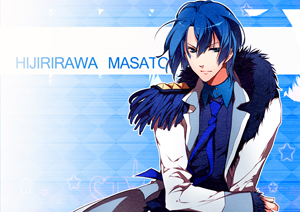
Hirijikawa Masato is a character from Uta no Prince-Sama. He is a male idol-in-training, and the heir to the large Hirijikawa business. He was raised by his incredibly strict father, who basically forced him into a sheltered life, where his only friend was Ren, who we talked about in the Playboys lesson. However, he’s not particularly distant because of it, but more socially awkward than anything. He’s not averse to hanging out with Haruka, though any sort of romantic contact leaves him in a fluster. It even seems like Haruka has Masato caught in her charms from the get-go. It turns out that earlier that year, Masato had run away from home to escape his father, and had been contemplating suicide, when he noticed a young girl who was singing in front of an orphanage. Her voice was so beautiful that it inspired him to continue living, so that he could become an idol and inspire people like she did. It turns out that this girl is, in fact, Haruka. Masato has his grandfather grant him entry to Saotome Gakuen in order to prove to his father that he is his own person and more than just an heir. Haruka and Masato spend a lot of time awkwardly dancing around romance, since they aren’t allowed to date but they love each other so much, but they still work together for Masato’s audition and the sexual tension only increases. Eventually, Masato gets so into the idol gig that he starts to ignore his family business requirements, which angers his father and causes him to verbally assault Masato. But thanks to the help of the principal, Masato’s father is able to sit still long enough to see his son’s audition, which he is so moved by that he accepts his son’s decisions. Also, Masato can’t hold it in any longer and proposes to Haruka, who agrees wholeheartedly. The principal catches wind of this, but allows it, since funding from the Hirijikawa business helps support the school, so as long as they keep the relationship a secret they will be fine. So everyone lives happily ever after.
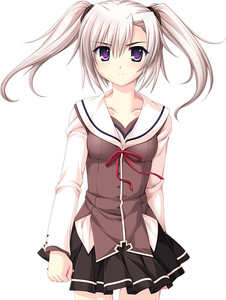
Shiratori Mizuha is a character from the visual novel G-Senjou no Maou, which is about a boy named Kyousuke Azai who is the adopted son of a yakuza boss. His normal life of crime manipulation and school is cut short one day by the arrival of a mysterious girl named Haru Usami and an international gangster who goes by the name “Maou”, which is Japanese for “devil”. Suddenly Kyousuke and his friends are caught in these two characters’ elaborate cat-and-mouse game, and Kyousuke must intervene in order to discover more about his unknown past.
Shiratori is the daughter of the rival business group to Kyousuke’s organization. She’s withdrawn and does not interact with others because she is socially awkward. Her father owns the school that all of the characters attend, and she is well aware of Kyousuke’s true identity. She has a strong sense of justice due to her father, and she tries to take Kyousuke down along with his organization. As a result, most of her interactions with Kyousuke are hostile and rude. However, Shiratori’s father is not the saint she thinks he is, as he’s made several under-the-desk deals, which eventually leads to Shiratori being taken hostage, and neither her position or her father can help her escape. Kyousuke leaps to the rescue and saves her, even though he knows about her intentions, and through this incident Shiratori discovers the moral grey. She ditches her cold attitude and begins the path of self-discovery, which eventually leads to her falling in love with Kyousuke (though she acts defensive and refuses to admit it) and trying to discover her own moral beliefs rather than blindly following those of another.
Rich characters are generally bad no matter the genre. You have characters on both sides that warm up to the main character and start to drop their rich person holier-than-thou attitude, but most of the time it seems that the rich character draws the main character in and either dominates them wholly or the main character wholly dominates them. The relationships built within this archetype generally aren’t the healthiest.
Silent Types
I said before in the previous writeup that quiet boys had two general subsets: the ones that are too cool and logical to talk to others, or the ones who are too shy to talk to others. The second group is the most popular of the two in otome games, and the same is true for male dating games as well.
In fact, you’re not likely to find much of the first group in male dating games. It seems to be more attractive to have girls who have difficulty conversing with others, as it tends to make more opportunities for “cute” embarrassing situations on the part of the girl. Also, as with quiet boys, the reserved girls often go through a transformative time with the main character where they learn the beauty of socialization and making friends, breaking out of their shell and learning to share their interests with the world. This tends to expand into the romantic side of the relationship as well; because these girls are inexperienced and unfamiliar with any sort of intimacy, it plays into this idea of treating girls delicately as you familiarize them with the ways of physical intimacy.
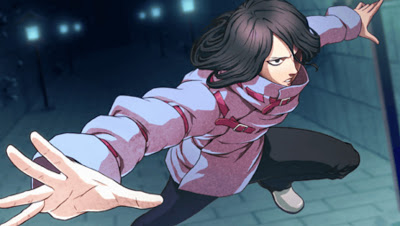
Kouta Meoshi is a character from Sweet Fuse: At Your Side. He is nineteen years old and the very definition of a NEET, which stands for “Not in Education, Employment, or Training”. He tends to stay at home all day playing video games, and the only reason he ended up at the amusement park was because the staff was handing out free DLC on opening day. He also tends to be very quiet and socially awkward, only speaking when spoken to or when he deems it necessary. While he’s not physically fit and he has no stamina, he shows his worth in the group by having an encyclopedic knowledge about all of the games on which the park attractions are based. That way, he can give the rest of the team an idea about what to expect, and help to solve the puzzles within. He’s also dedicated to helping out the team in any way he can, and often moves forward in spite of his fears. While he’s not big on physical activity, his reflexes are top-notch, which allows him to help out the team by DDR-ing his way through an arrow trap hallway. Throughout their time together, Kouta learns how to open up and interact with others, particularly Saki, since she’s the only girl in the group and he’s especially on edge when it comes to girls. When it comes down to it, though, he can be a real charmer and a great companion, even in the face of adversity. Kouta’s a good kid, though Saki always has to take the first step in their relationship.
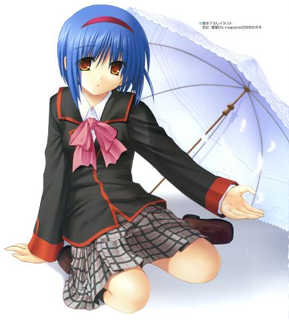
Mio Nishizono is a character from the visual novel Little Busters!, which is about a boy, Naoe Riki, who is dissatisfied with how fast life is passing him and his friends by. In order to recapture their youth and hold on to their childhood for as long as possible, they decide to start recruiting new friends and create a baseball team. However, Naoe has a lot to learn about growing up and what it means to truly live.
Mio is a quiet girl who does her best not to stand out or draw any attention to herself. She keeps a parasol with her at all times, because her skin is very sensitive and exposure to the sun is dangerous for her. In class, she stays quiet and keeps her head in her books. During lunch, she sits far away from the other students and reads from her large collection of books. When school’s out, she’s in her room reading. I hope you see the trend here. However, when Riki approaches her, she turns out to have a very dry sense of humor, almost indistinguishable from her serious attitude, and she has a very deep knowledge of Japanese literature, particularly tanka poetry. She finds it difficult to talk to others, because she doesn’t share the same interests as many others, and she has difficulty controlling herself when she talks about the things she enjoys. While this seems to be the only reason she doesn’t reach out, it later turns out that she doesn’t believe that she deserves to be loved. She has a split personality that she believes is a separate entity in her mind, and out of fear of this “imaginary friend”, her parents medicated her in order for Mio to forget her other personality and act more “normal” for a girl her age. Eventually, she remembered her other personality, and because she found it so devastating that she forgot about her “best friend” for so long, she felt like her loneliness was a way of repaying for this mistake.
Silent types really don’t end up that different when it comes down to it. It’s still a story about teaching someone to open up and enjoy the world around them, though male dating games tend to play up the embarrassment factor for these characters in order to create more “cute” situations for these characters to fall into. This sort of innocence is a popular trait in male dating games, often for less-than-reputable reasons.
I tried to keep the selection of male dating games to the ones that at least have some sort of value to them (whether it be in plot or sheer absurdity), but I guess this isn’t really indicative of what these tropes are really like in male dating games. The problem is that so many of these archetypes come from games that are cookie-cutter sex simulations that put more focus on showing off anime boobs than trying to actually create characters for whatever story they want to tell, and so it’s difficult to talk about the genre without bringing these up. There are a number of characters in this comparison that aren’t really accurate to what I’m describing in the opening, even though they’re generally going to represent a better look into the archetype from the perspective of a dating game that tries to be more than just a bunch of naked anime pictures taped together to make a story.
As you can see, while there are number of similarities between the two genres, especially with archetypes like the childhood friend or the silent type, there are also a number of differences, especially when it comes to the aspects that these genres tend to focus on for their characters. Women are generally more sexualized because of the audience that male-oriented visual novels tend to draw. While boys are also generally beautified for the sake of the game, they also tend to be more rounded characters that girls could have a safe relationship with at their level of comfort (though there are plenty of games out there if that’s not the dynamic you’re looking for). Male dating games put sex as a goal to reach at the climax (heh) of the story, which female dating games leave the possibility open, or outright include it, but don’t tend to push the issue. In the end, it all comes down to the perceived audience for these games, and these games are usually written to accommodate rather than to break expectations.
Addendum:
Demolition Man brought up the point that I was being a bit harsh on male-oriented dating games, and rightly so, as I focused highly on the negatives without creating at least some balance. I should point out that there are plenty of visual novels out there that involve a strong cast of characters or strong plots or both. Games like Steins;Gate, Little Busters!, or Katawa Shoujo are all very solid games that create more balanced relationship dynamics and allow both the main character and their partner to grow, and go beyond the "porn" label that many of these sorts of games get, and there are plenty more good games out there to discover. However, this certainly is not the majority of the genre, and this sort of stigmata can make it difficult to find the good ones. But I believe it's worth looking into in order to find these games, as I have gotten a lot of entertainment out of them, both as a story and as an interactive experience. Hell, I'll even admit that I've had a transformative personal experience with at least one of the games I've listed. There are great things to find, it just takes work, and it's unfortunate that the market clamors more for pandering sex games rather than greater experiences. My point still stands that the tropes of this genre tend to be awful, but the diamonds in the rough are well worth the work to find them.